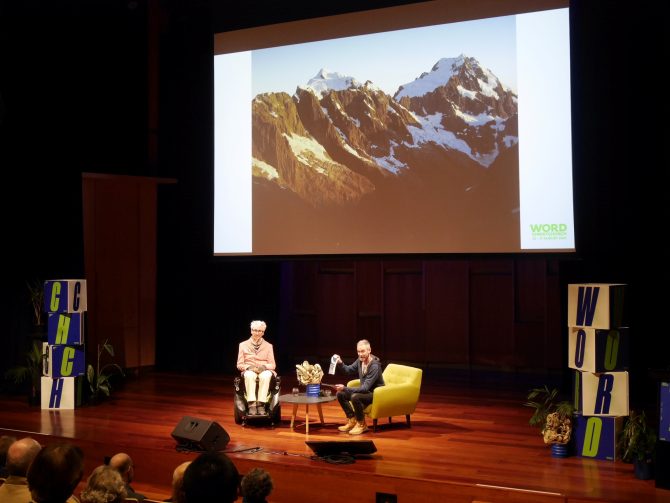On Friday afternoon at The Piano, an attentive audience gathered to listen to David Vass and Nic Low discuss the pleasures and perils of climbing mountains. David recently published a memoir of his mountain life, Not Set in Stone, and the conversation traversed writing, reading, the enchantment of nature and the sublime alpine, as well as risk, recovery, and loss. After an accident in Fiordland in 2015 ended his climbing career, David has found new ways to navigate a changed life.
David began by reading an excerpt from the book, then described his early days in the outdoors. Fly fishing was his "gateway drug", and the absorbing quality of rivers led him to ever-more remote areas. His gaze naturally turned upward, and the desire to explore higher places grew. What called to him in the alpine realm was a certain purity he saw in the mountains. The sharpness, clearness, the cold. He described there being a quality to the alpine that's hard to match in other ways, and the fine line between beauty and peril.
Nic Low then asked about David's reading and writing history. He'd always been a bit of a reader, and felt his imagination was awakened by books when he was little. When he became a climber, he devoured mountain literature. After the accident in the Darrans, while in the spinal unit at Burwood Hospital, a psychologist told him there was a good chance he mightn't be able to do the things he always had, and asked if there was anything else he'd like to do. Straight away, David replied "writing", despite having not considered being a writer before this.
Conversation returned to the mountain world, and Nic Low asked about David's first encounters with Kā Tiritiri o Te Moana, the Southern Alps. He was involved with the Canterbury University Tramping Club, a hotbed of youthful enthusiasm - "you just got into it, and off you went". Early exploits in Arthur's Pass saw a few misadventures, including being pulled off the South Face of Phipps Peak by a falling partner, and an epic on the Ōtira Face of Mt Rolleston involving a night out in -14 degree conditions. He threw himself in the deep end, yet kept going, "it just felt right".
The issue of risk was raised, and attitudes towards risk. Nic and David talked about the spectrum of approaches in facing risk in the mountains as a beginner - "apprenticeships of near misses" versus the kinds of highly managed, 10 day, professional-led courses now available to the would-be mountaineer. For David, life is a risk, a balancing act, and it's important to put into perspective what it means when things go wrong.
Talk turned to Aoraki, and David's period climbing in that restless, shifting, humbling section of Kā Tiritiri o te Moana. He described the way in which many of his climbs were inspired by particular mountain features, and "the pull of a line" - perhaps a shadowed ice gully, or a sharp, elegant ridgeline.
From the chossy heights of the Aoraki region to the granite solidity of the Darrans. The beautiful photograph on the projector behind the speakers showed the view David and his friends would wake up to from their bivvy site on a trip in the Fiordland mountains. Entry and exit from these rugged heights involved finding the line of least resistance, and on the day of the accident they began descending as a storm grew. After 14 hours of rough, tiring travel, descending through bush; a root broke, David fell about 3m, and knew, immediately, his neck had broken. Lying immobile and hypothermic in the storm for hours, awaiting rescue, David said he felt as though this was the end of his life.
Now, though, he doesn't feel like that. Navigating the span between those two mental states has been a complex process. Nic asked if the mental discipline involved in mountaineering had been of use in rehabilitation from the injury, and in finding purpose now. David thought yes, that some of the mental aspects of his mountaineering life - hoping for the best, committing to something that may well be worth it, hoping it'll all pan out - have helped.
After the accident, David began the process of becoming a writer. Initially, he was writing stories as a means of preserving memory, so that he wouldn't forget the mountain parts of his life. He wrote a hundred such stories, and found shifts and change in his writing through the process. He then enrolled in the Masters of Creative Writing programme at the Institute of Modern Letters, which he found to be an intensely creative environment, with plenty of beneficial feedback.
After a good portion of his life being dedicated to exploring the physical, these days David is exploring the expansive possibilities of the mind and the mental realm. He's working on a new book, and judging by the skilful and affecting quality of his writing in Not Set in Stone, it'll be one to look out for.
Find out more
- WORD Christchurch website and 2023 programme
- Follow @WORDChCh on Twitter
- Follow WORDchch on Instagram
- Like WORD Christchurch on Facebook
- Our WORD Christchurch 2023 page





Add a comment to: WORD Christchurch 2023: Not Set in Stone – David Vass